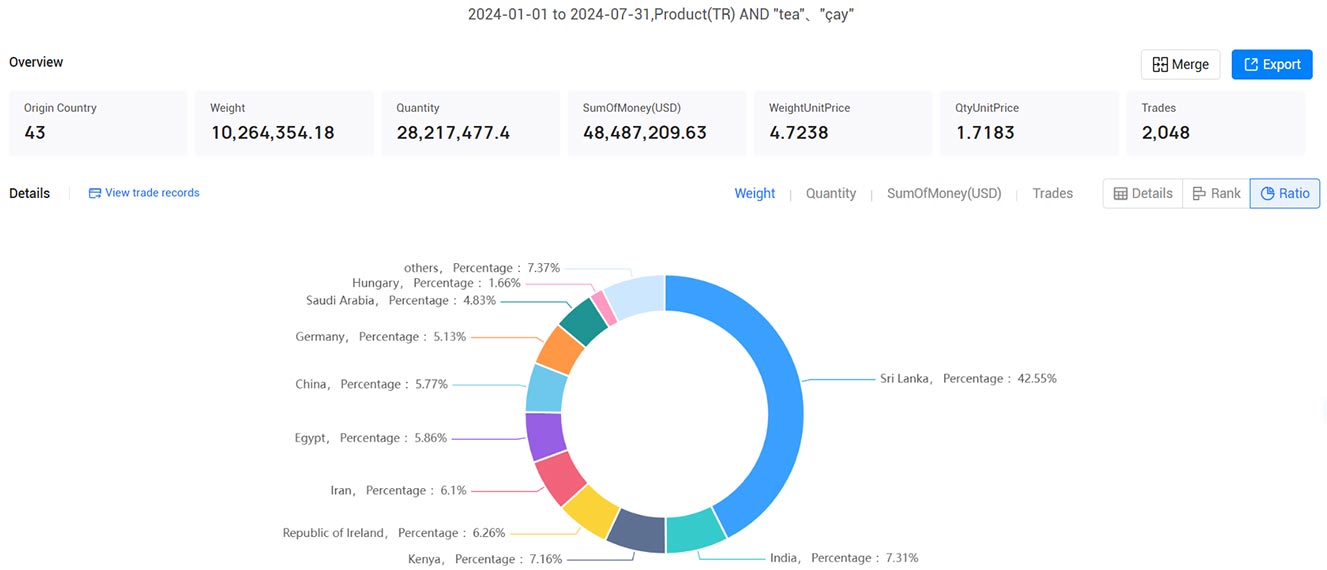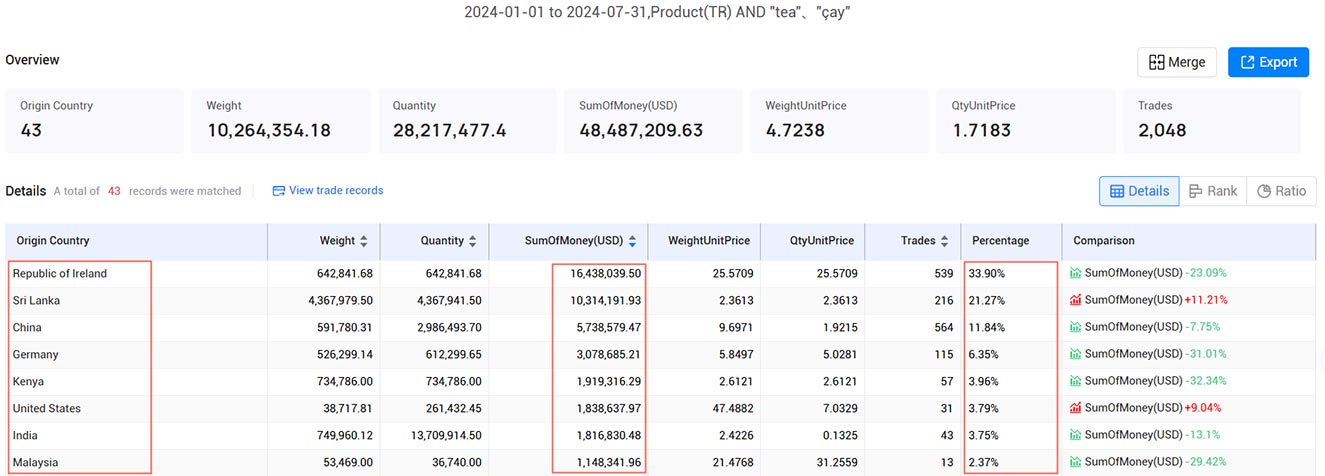 Import News
Import News
 31-10-2024
31-10-2024
The tea-growing regions of Turkey are concentrated along the eastern coast of the Black Sea. With its humid climate, varied terrain, and proximity to the sea, this area provides ideal conditions for tea cultivation.
In terms of total tea production, Turkey ranks among the top five countries. In 2023, the tea harvest reached 13.566 million tons. From 2019 to 2023, the country's tea production grew by an average of 3.3% annually, totaling 343,500 tons. Exports during this period rose from 42,000 tons to 53,000 tons, reflecting the increasing popularity of Turkish tea globally, especially in European countries.
Turkey has the highest per capita tea consumption in the world. From 2019 to 2023, per capita tea consumption in the country grew at an average annual rate of 5.1%, reaching 4.6 kg per year by the end of 2023. This far exceeds the consumption of its main alternative beverage, coffee, at about 0.9 kg per person per year.
Black tea is the most popular type of tea in Turkey, accounting for 98.2% of total retail sales in 2023, or 240,400 tons. Fruit/herbal teas and green tea made up 1.0% and 0.7% of sales, respectively. These types of tea continue to be well-liked in the country, with consumers particularly valuing their health and immune-boosting benefits.
Over recent decades, the state-owned company Çaykur has maintained a substantial share of the Turkish tea market. As of the end of 2023, its share was 35.6%. The second leading brand by sales was the international company Lipton Teas and Infusions, with a 25.4% market share in 2023. Other popular local tea producers include Doğuş Çay (10.9%) and Doğadan (8.1%). Together, these top four suppliers accounted for 80.0% of the country's tea sales in 2023.

In 2023, total Turkey's tea imports reached 17,000 tons, valued at $36.4 million. Compared to 2022, import volume increased by 57.2% (+6,200 tons), while import value rose by 52.8% (+$12.6 million). From 2019 to 2023, tea purchases from foreign markets decreased at an average annual rate of 3.4% in volume and 2.9% in value.
Traditionally, Turkey's tea imports are mostly black tea, which accounted for 99.5% of import volume (16,900 tons) and 98.4% of import value ($35.8 million) in 2023. Green tea accounted for only 0.5% of volume and 1.6% of value. Compared to 2022, black tea imports increased significantly, with volume rising by 57.3% (+6,200 tons) and value by 54.8% (+$12.7 million). Green tea imports rose by 39.4% to 92.0 tons, although import value declined by 17.0% to $565,000. However, the 2023 import volume remains below the levels seen from 2019 to 2021.
In 2023, Sri Lanka was Turkey's top tea supplier, accounting for 52.7% or 9,000 tons of imports. Iran was second, contributing 24.8% of Turkey's tea imports. The third major supplier by volume was India, with a 9.5% share. Cumulatively, the top eight tea-exporting countries to Turkey accounted for 99.6% of Turkey's tea imports.
Compared to 2022, Turkey's tea imports from Sri Lanka rose by 77.9% (+39,000 tons), from Iran by 69.5% (+17,000 tons), and from India by 2.4 times (+939.0 tons). Meanwhile, imports from Kenya and the Netherlands decreased by 16.6% (-305.0 tons) and 29.2% (-106.0 tons), respectively.
By value, Sri Lanka remained the leading supplier in 2023, with products valued at $20.3 million (55.9% of import value). Other major suppliers to the Turkish market included Iran (14.0%), India (11.7%), and Kenya (10.8%). Together, Turkey's top eight tea-exporting countries accounted for 97.2% of its import value.
In 2023, the average import price of tea in Turkey fell by 2.8% to $2,137 per ton. The most expensive products were sourced from China, priced at $7,149 per ton (3.3 times the average price), and the Netherlands at $2,914 per ton (36.4% higher than the average). The most competitively priced products came from Iran at $1,205 per ton (43.6% below the average) and Malawi at $2,096 per ton (1.9% lower).
From January to July 2024, Sri Lanka's share of Turkish tea imports dropped from 52.7% to 42.55%. India moved up to second place, accounting for 7.31% of imports, followed by Kenya with 7.16%. Together, the top eight tea-exporting countries to Turkey accounted for 86.14% of Turkey's tea imports.

Compared to the same period, Turkey's tea imports from Sri Lanka increased by 3.72%, from India by 8.77% (+17,000 tons), while imports from Iran decreased by 76.48%.
From January to July 2024, by value, Turkey's primary tea supplier was Ireland, with products valued at $16.43 million (33.9% of import value) at an elevated average price of $25.57 per kilogram. Other key suppliers to the Turkish market included Sri Lanka (21.27%), China (11.84%), and Germany (6.35%). Overall, Turkey's top eight tea-exporting countries accounted for 87.23% of its import value.

Would you like more detailed data on Turkey's tea imports and exports in 2024?
Tendata provides the latest, 100% reliable, and accurate data on Turkey's tea imports and exports. It can assist you in multiple ways, including generating competitive analysis reports on Turkish tea exporters' ports, suppliers, and importers.
Turkey's tea import and export data includes valuable information for traders, such as customs declaration dates, HS codes, shipment dates, product descriptions, names of export ports, product values, and quantities. You can analyze these data to generate reports on major exporters, buyers, and destination countries, making it a key tool for navigating the tea export market.
Customs data contains a vast amount of information, and extracting relevant
customer contact information can be time-consuming, with results not always
meeting expectations. Is it truly the case, or is it because customs data is
being used incorrectly, resulting in wasted effort and time?
Utilizing customs data for customer development can be achieved by precisely characterizing all buyers and their procurement systems in the target market. This allows for the quick identification of the most compatible customers, discerning their credit systems and procurement information, determining high-quality customers and profit margins, enhancing development efficiency, and improving overall effectiveness.
In customs data, one can observe the suppliers of buyers. Some of these suppliers are trade companies and also potential customers. In-depth analysis can be conducted on these trade companies, and key customers can be selected for focused development. Information such as buyer contacts, trade partners, procurement cycles, and purchase volumes can be obtained. While customs data may lack contact information due to being derived from bill of lading information, Tendata iTrader provides not only customs data but also business and internet data. This allows for the direct extraction of contact information and positions based on buyer names, making customer development through customs data seamless. (>>> Click To Get Free Demo for Customs Data From 100+ Countries) For new customer development using customs data, three strategies are available for consideration.

Category
Leave Message for Demo Request or Questions


 T-info
T-info T-discovery
T-discovery

 My
Tendata
My
Tendata Market Analysis
Market Analysis Customer
Development
Customer
Development Competitor
Monitoring
Competitor
Monitoring Customer Relationship
Customer Relationship





































































































































